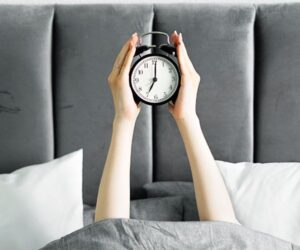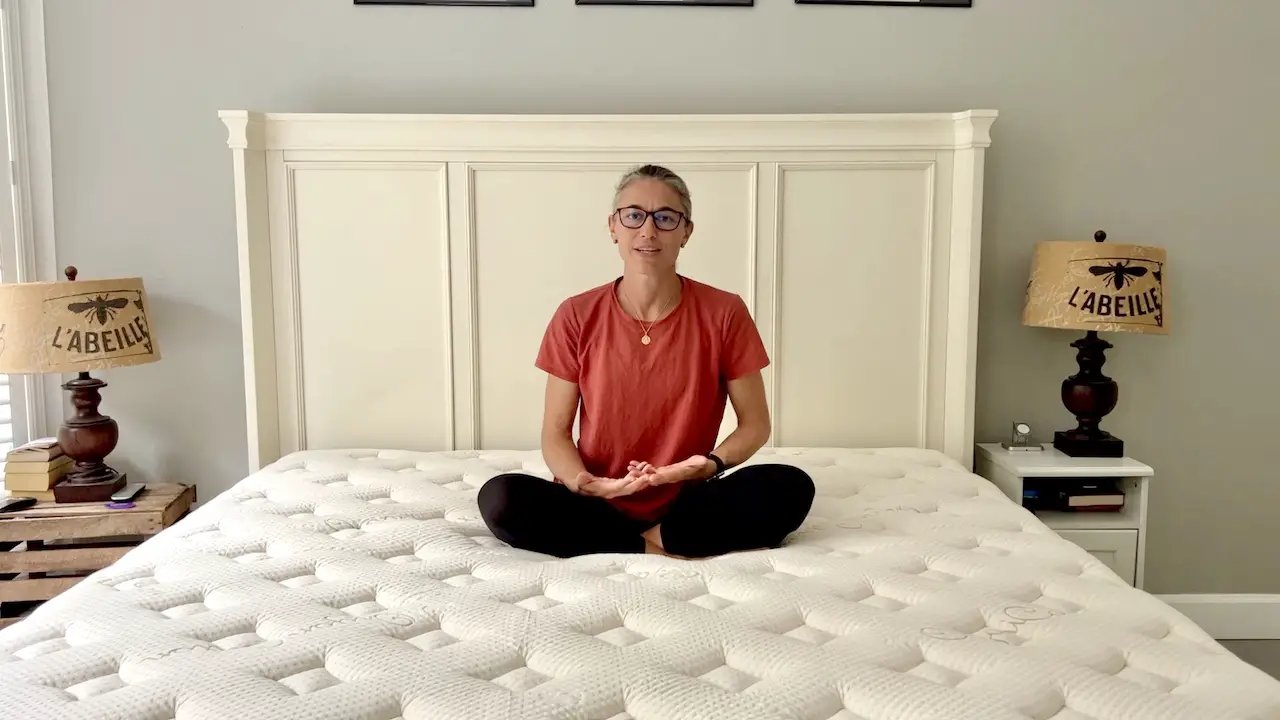WHY DO I WAKE UP TIRED
10 Common Reasons You're Not Waking Up Refreshed
Waking up exhausted is one of the most frustrating ways to start the day. If you’ve ever wondered, “why do I wake up tired even after 8 hours of sleep?”, you’re not alone.
Morning grogginess, poor energy, and the feeling that your night’s rest didn’t “count” are common experiences. And while the causes can vary, there is usually an underlying issue that can be addressed.
Let’s take a closer look at the most common reasons behind tired mornings — including lifestyle habits, hormone imbalances, sleep disorders, and stress — and offer practical solutions for rested mornings. Whether you’re trying to optimize your sleep routine or looking for a better mattress, understanding the root of your fatigue is the first step towards waking up refreshed.
Note: this article does not constitute medical advice. Consult with a health provider before starting any new medical treatment or making lifestyle changes.
Table of Contents
Why Do I Wake Up Tired?
The question “why do I wake up tired” never really has a simple answer. It is not always about how many hours you sleep—but how well you sleep, when you sleep, and what’s happening in your body and brain during that time.
Let’s dive into the top 10 causes of tiredness after sleep.
1. Poor Sleep Quality
Even if you’re getting 7–9 hours of sleep, you may not be getting enough deep sleep or REM sleep, both of which are critical for feeling restored upon waking up.
Signs of poor sleep quality:
Waking up frequently during the night
Tossing and turning
Feeling groggy in the morning
Vivid or disturbing dreams
Snoring or gasping for air
Solutions:
Stick to a regular sleep-wake schedule
Invest in a high-quality mattress that supports spinal alignment
Try sleep tracking apps to monitor your sleep cycles
Avoid heavy meals and screens before bed
2. Sleep Disorders
One of the most overlooked answers to “why do I wake up tired” is an undiagnosed sleep disorder. These conditions can disrupt your rest even if you’re unaware of them.
Common sleep disorders include:
Sleep Apnea
Sleep apnea causes breathing to repeatedly stop and start during sleep, disrupting your oxygen intake and rest cycles.
Symptoms:
Loud snoring
Gasping for air at night
Morning headaches
Daytime drowsiness
Insomnia
Difficulty falling or staying asleep, often linked to stress or anxiety.
Symptoms:
Taking more than 30 minutes to fall asleep
Waking up often during the night
Waking up too early and not falling back asleep
Restless Legs Syndrome (RLS)
Uncontrollable urge to move your legs, especially in the evening or when lying down.
Delayed Sleep Phase Syndrome
A circadian rhythm disorder where your sleep schedule is shifted later than normal.
What to do:
Talk to a sleep specialist
Undergo a sleep study (polysomnography)
- Consider an adjustable bed if diagnosed with sleep apnea
- Consider CPAP therapy if diagnosed with sleep apnea
- Use a weighted blanket to combat insomnia naturally
- Consider natural remedies for insomnia
3. Hormonal Imbalances
Your hormones play a significant role in regulating sleep. Imbalances in melatonin, cortisol, or thyroid hormones can leave you feeling tired — even after sleep.
Key hormones involved in sleep:
Melatonin: Helps regulate the sleep-wake cycle
Cortisol: Should be higher in the morning to help you wake up
Thyroid hormones: Low levels can cause fatigue
Signs of hormonal imbalance:
Fatigue that doesn’t improve with rest
Mood changes
Weight gain or loss
Sensitivity to temperature
- Shaking
Solutions:
Get a blood test to assess hormone levels
Avoid artificial light before bed to support melatonin production
Practice stress management to regulate cortisol levels, including using meditation apps
4. Poor Sleep Environment
A noisy, uncomfortable, or overly warm sleep environment can lead to micro-awakenings that fragment your sleep without you realizing it.
Environmental sleep disruptors:
Uncomfortable mattress or pillow
Room temperature that’s too warm
Noise pollution
Light exposure
Solutions:
5. Diet and Lifestyle Habits
What you eat — and when — can dramatically impact your sleep quality.
Common issues:
Eating too close to bedtime
Skipping meals or fluctuating blood sugar
Not getting enough magnesium or B vitamins
Caffeine and sugar:
Avoid caffeine at least 6 hours before bed
Reduce sugar intake to prevent blood sugar crashes overnight
Solutions:
Have a light, sleep-supportive snack (like a banana or almonds) if you’re hungry before bed
Eat balanced meals with complex carbs, protein, and healthy fats
Stay hydrated but limit fluids close to bedtime
6. Mental Health and Stress
If you’re feeling anxious, depressed, or overwhelmed, your brain may not be truly “at rest,” even when you’re asleep.
Stress-related signs:
Racing thoughts at bedtime
Waking up during the night thinking about your to-do list
Waking up feeling anxious or low
Solutions:
Practice relaxation techniques like journaling, breathwork, or meditation
Set boundaries on work and screen time in the evening
Try cognitive behavioral therapy for insomnia (CBT-I)
7. Irregular Sleep Schedules
Your body thrives on consistency. Going to bed and waking up at different times each day can confuse your circadian rhythm, leaving you feeling groggy in the morning.
Common causes:
Jet lag
Late nights on weekends
Solutions:
Stick to a consistent sleep schedule—even on weekends
Use light exposure to reset your circadian rhythm
Consider melatonin supplements (under guidance)
8. Substance Use: Alcohol, Caffeine, and More
Alcohol
While alcohol can make you feel sleepy, it fragments your sleep and suppresses REM. It may also increase nighttime awakenings with bathroom trips and more vivid dreams.
Caffeine
Caffeine has a half-life of about 5 hours, which means a 4 PM coffee could still be affecting you at bedtime.
Nicotine
Nicotine is a stimulant and can delay sleep onset or cause night awakenings.
Solutions:
Avoid alcohol 3–4 hours before bed
Limit caffeine to the morning
Try natural sleep aids like magnesium or chamomile
9. Technology and Blue Light Exposure
Exposure to screens in the evening suppresses melatonin production and interferes with your body’s natural bedtime cues.
Common culprits:
Late-night scrolling
Watching TV in bed
Using devices with bright screens
Solutions:
Use blue light-blocking glasses
Activate “night mode” on your devices
Shut off screens at least an hour before bed
10. Undiagnosed Medical Conditions
Sometimes the reason you keep asking “why do I wake up tired” is tied to a medical issue that hasn’t been diagnosed yet.
Possible conditions:
Anemia
Hypothyroidism
Chronic fatigue syndrome
Diabetes
Heart disease
When to seek help:
You’ve tried lifestyle changes and still feel tired
Fatigue affects your ability to function
You notice other unusual symptoms (dizziness, weight changes, pain)
How to Wake Up Feeling Refreshed
Now that we’ve answered “why do I wake up tired”, here are some actionable tips to help you wake up with more energy:
✅ Establish a Wind-Down Routine
Create a 30–60 minute bedtime ritual that includes low-lighting, reading, meditation, or light stretching.
✅ Choose the Right Mattress
Your mattress should suit your sleep position, weight, and temperature preferences. A mattress that’s too soft or too firm can throw off spinal alignment and lead to poor rest.
Explore our mattress reviews for the best options for back sleepers, side sleepers, and hot sleepers.
✅ Wake at the Right Time in Your Sleep Cycle
Use a sleep tracking app or smart alarm that aims to wake you during lighter sleep stages (rather than deep sleep), which can reduce grogginess.
✅ Get Morning Sunlight
Natural light helps reset your internal clock and increases morning cortisol production (a good thing for energy levels).
When to See a Sleep Specialist
If you’ve been asking yourself “why do I wake up tired” for more than a few weeks—and lifestyle tweaks haven’t helped—it’s time to speak to a doctor or sleep specialist.
You might benefit from:
A sleep study (especially for sleep apnea or parasomnias)
Blood work to check for thyroid or nutrient imbalances
A referral to a mental health professional for anxiety or depression
Why Do I Wake Up Tired - Final Thoughts
If you are constantly waking up tired, it is your body’s way of saying something isn’t right. It could be your mattress, your stress levels, your sleep habits — or an underlying medical issue. Whatever the cause, help is available.
Start by optimizing your bedroom setup and sleep hygiene, and don’t hesitate to consult a professional if the tiredness doesn’t improve. You deserve to wake up feeling truly rested.
References
- National Library of Medicine. (2016). Effects of Diet on Sleep Quality. Retrieved from https://pmc.ncbi.nlm.nih.gov/articles/PMC5015038/
- Harvard Health. (2024). Blue light has a dark side. Retrieved from https://www.health.harvard.edu/staying-healthy/blue-light-has-a-dark-side
- National Library of Medicine. (2009). Effects of an irregular bedtime schedule on sleep quality, daytime sleepiness, and fatigue among university students in Taiwan. Retrieved from https://pmc.ncbi.nlm.nih.gov/articles/PMC2718885/
FAQ
Most frequent questions and answers
Poor sleep quality, stress, or undiagnosed sleep disorders can leave you feeling tired despite getting enough hours.
Yes. Heavy meals, caffeine, or alcohol before bed can disrupt sleep and cause morning fatigue.
Excessive screen time can affect melatonin production, leading to poor sleep and tiredness in the morning.
Yes. Conditions like sleep apnea, hypothyroidism, or depression can interfere with restful sleep.
Maintain a consistent sleep schedule, manage stress, improve sleep hygiene, and consult a doctor if issues persist.
Why do I wake up tired even after 8 hours of sleep?
Poor sleep quality, stress, or undiagnosed sleep disorders can leave you feeling tired despite getting enough hours.
Can diet affect why I wake up tired?
Yes. Heavy meals, caffeine, or alcohol before bed can disrupt sleep and cause morning fatigue.
Does screen time before bed make me wake up tired?
Excessive screen time can affect melatonin production, leading to poor sleep and tiredness in the morning.
Could medical conditions be why I wake up tired?
Yes. Conditions like sleep apnea, hypothyroidism, or depression can interfere with restful sleep.
How can I stop waking up tired?
Maintain a consistent sleep schedule, manage stress, improve sleep hygiene, and consult a doctor if issues persist.
Share this deal with a friend!

Laura Georgieff
Laura is a mother of three who did not sleep through the night for the first 5.5 years of her kids' lives. She is passionate about sleep quality and loves sharing her experience and knowledge of all thing bedding! It is her mission to help you make the best decisions when it comes to sleep and help you get the best deal on the market!






